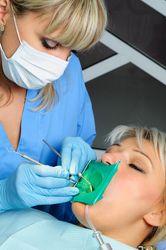What Oral Surgeons Want You to Know About Biopsies

During routine checkups, your dentist cleans your teeth, checks for signs of gum disease, and performs a preliminary screening for oral cancer. If they find abnormalities during this exam, they will likely refer you to an oral surgeon for additional X-rays and a biopsy. According to the American Cancer Society, nearly 50,000 people are diagnosed with the disease each year, and almost 10,000 of those cases are fatal. If you have been referred to a surgeon for more in-depth tests, you may have questions about the process.
What Is a Biopsy?
When dentists find abnormalities like a lump, red or white patches, or tissue that is thicker than usual, they need to find out whether it is an early sign of cancer. In some cases, these issues could be related to an injury or benign cyst, so they need to be studied closely via biopsy. During a biopsy, a small sample of cells or tissue is removed from the mouth and sent to an oral pathology lab. There, the cells are analyzed to determine whether they are cancerous.
How Is It Performed?
 Oral biopsies require less preparation than other procedures since the inside of the mouth is easily accessible. There are no preliminary steps you need to take at home, and the collection process is completed in the oral surgeon’s office. Most people are given a local anesthetic, but some people require general anesthesia if the area of concern is deep in the mouth or throat.
Oral biopsies require less preparation than other procedures since the inside of the mouth is easily accessible. There are no preliminary steps you need to take at home, and the collection process is completed in the oral surgeon’s office. Most people are given a local anesthetic, but some people require general anesthesia if the area of concern is deep in the mouth or throat.
During the biopsy, the surgeon takes a sample of tissue from the mucosa, or lining of the mouth or underlying jawbone. The tissue is then sent to a lab for further examination under a microscope.
What Happens After the Biopsy?
The results of the test can take up to a week to arrive, and your oral surgeon will notify you when they are available. If the biopsy is negative, then the sample did not show signs of oral cancer; however, the results will remain on your medical record for future reference. If the biopsy is positive, then you will be referred to an oncologist for specialized care.
Anchorage-area dentists trust the team at Oral Surgery Associates of Alaska when their patients need follow-up testing after a routine exam. These oral surgeons provide a wide range of procedures including oral pathology and jaw surgery to keep patients’ mouths healthy for years to come. Call (907) 561-1430 to make an appointment, and visit their website for more information about preparing for and recovering from oral surgery.
About the Business
Have a question? Ask the experts!
Send your question

